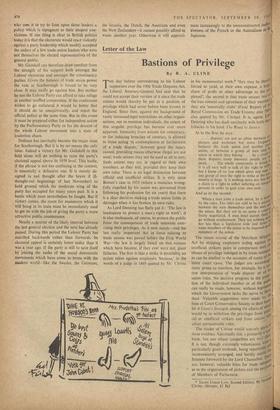Letter of the LaW
Bastions of Privilege
By R. A CLINE Tun day before surrendering to his Labour supporters over the 1906 Trade Disputes Act, the Liberal Attorney-General had said that he could not accept their version of it since the trade unions would thereby be put in a position of privilege which had never before been known in England. Since then, against the background of vastly increased legal restrictions on other organi- sations, not to mention individuals, the extent of this singular privilege has become ever more apparent. Immunity from actions for conspiracy, or for inducing breaches of contract, is allowed to those acting 'in contemplation or furtherance of a trade dispute,' however great the injury caused, providing means otherwise illegal are not used; trade unions may not be sued at all in tort; trade unions may act, in regard to their own members, as they will, provided they keep their own rules. There is no legal distinction between official and unofficial strikes. It is only since Bonsor's case in 1955 (where a musician wrong- fully expelled by his union was prevented from following his profession for six years) that there is a clear decision making a trade union liable in damages when it has broken its own rules.
As Lord Denning has flatly put it : 'The law is inadequate to protect a man's right to work'; it is also inadequate, of course, to protect the public from the consequences of trade unionists exer- cising their privileges. As it now stands—and the last really important Act in force relating to trade unions was passed before the First World War—the law is largely based on two notions which have become, if they ever were not, giant fallacies. The first is that a strike is invariably an action taken against employers 'because,' in the words of a judge in 1869 quoted by Mr. Citrine in his monumental work,* 'they may be there! forced to yield, at their own expense, a larP share of profit or other advantage to the ay ployed'; the second is that trade unions rest the true consent and agreement of their members' they are 'essentially clubs' (Final Report of lb: Royal Commission on Trade Unions; also 186' also quoted by Mr. Citrine). It is, again, 11d Denning who has dealt succinctly with both t1 fallacies in his book The Road to Justice.
As to the first, 'he says: . . . disputes are not so often between en:; ploycrs and workmen but more frequent'd; between the trade union and another lrav union, or between a group of men and t union to which they belong. . . As a result °, these disputes many innocent people are t0 jured. . . . The whole community is struck!: It is all very well to talk of the right to stntocr' but I know of no law which gives any man, any group of men the right to strike at the etwo munity at large. It is nothing more nor less that a claim to a right to inflict suffering on innoci.' persons in order to gain your own ends.
And as to the second: When a man joins a trade union, he is Nile by the rules. The rules are said to be a contrad between the men themselves and the men A",., the union. But they are in no sense a contra negotiated. A man must accept thern!r, go without employment. They are nothing 011,), nor less than a legislative code laid down 0 some members of the union to be imposed on members of the union. The recent misuse of the Merchant ShiPPilige Act by shipping employers acting against b unofficial strikers pales in comparison with ,1,5, abuses of privilege indulged in by trade unioals as can be studied in the accounts of many Of th 'e latest court cases, The judges are accordidh; more prone to interfere, for example, by a row interpretation of 'trade dispute' or of I' union rules. No decisive progress in the Pr°tc‘ tion of the individual member or of the 101Lii: ,0 can really be made, however, without legislat; which the Government lacks the nerve to duce. Valuabre suggestions were made by Inns of Court Conservative Society in their b(3°. ,D let A Giant's Strength, among the effects of 1°1'1i, would be to withdraw the privileges front r°1,1,0 cal or unofficial strikers and from unions " adopt unreasonable rules. , at The reader of Citrine would scarcely gnc,''‘t• these troubles. Admittedly this _s primarily'a hook, but one whose sympathies are ver),.c{eaa It is not, though extremely voluminous, "e'ufj,1 particularly good textbook, being repetitious `tit inconveniently arranged, and hardly merits ,r, fulsome foreword by the Lord Chancellor. 11`.0: are, however, valuable hints for trade Larli°r11,li , as to the organisation of pickets and the paY'1 of Members of Parliament.
no"
,-
* TRADE UNION LAW. Second Edition. by -r Citrine. (Stevens, £5 Ss.)










































 Previous page
Previous page